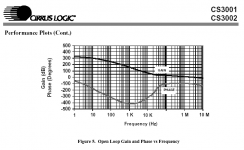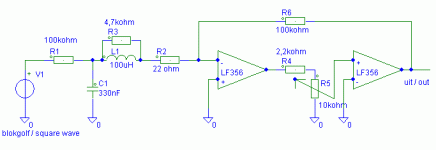This opamp must be the all-time record holder for high gain! It's meant for dc to 2kHz use in instrumentation etc. http://www.cirrus.com/en/products/pro/detail/P1010.html
Check those dB's!!




Check those dB's!!





Attachments
This is the first time I've seen a datasheet for an operational amplifier designed to be conditionally stable in the control theoretical sense of the word. It will be perfectly stable provided that the closed-loop gain is LOW enough, so that the 0dB loop gain point lies in the first-order part of the curve, not on the steep (fifth order or so) part.
No, if you make a unity gain buffer with it, it will be perfectly stable (although conditionally stable in the control-theoretical sense). It is a common misconception to believe that a control system will always oscillate if the loop gain is greater than unity at a frequency where the phase shift around the loop equals 360 degrees. This is not the case if the phase shift returns to a safe value before the magnitude of the loop gain drops to unity. This fact is used in the millions of high order sigma delta modulators sold every year, but I have never seen it used in an op-amp before.
If you don't believe me, I'll see if I can find the schematic of the conditional stability demonstrator circuit I built in 1994 or so.
If you don't believe me, I'll see if I can find the schematic of the conditional stability demonstrator circuit I built in 1994 or so.
MarcelvdG,
Could you suggest some educational material that explains this part of control theory? Of course, I am also curious to see your conditional stability demonstrator.
Hmmm. What would the step response of a unity gain amplifier configured from an op-amp with the pictured open-loop gain look like?
Thanks,
-- mirlo
Could you suggest some educational material that explains this part of control theory? Of course, I am also curious to see your conditional stability demonstrator.
Hmmm. What would the step response of a unity gain amplifier configured from an op-amp with the pictured open-loop gain look like?
Thanks,
-- mirlo
Marcel
With d-s modulators you usually have multiple feedback loops and quite some measures to get them back into normal operation if they get unstable or to prevent such situations from start.
If you search for patents on ds modulators, most of them deal with the auxiliary circuitry to maintain stability.
I think you can't compare an OPAMP to a d-s modulator.
Regards
Charles
With d-s modulators you usually have multiple feedback loops and quite some measures to get them back into normal operation if they get unstable or to prevent such situations from start.
If you search for patents on ds modulators, most of them deal with the auxiliary circuitry to maintain stability.
I think you can't compare an OPAMP to a d-s modulator.
Regards
Charles
The attached figure is similar to the demonstrator circuit I built in 1994. Perhaps one or two component values are slightly different, but not to such an extent that it makes any difference.
The circuit has three very low-frequency poles in its loop gain, two caused by the op-amps and one caused by the 330nF capacitor at the input. Further, there are two zeroes at much higher frequencies, caused by the 22 ohm resistor and 100 microhenry inductor.
The loop gain therefore drops at a third-order rate until the zeroes reduce the slope to first-order. With the potmeter R5 at maximum gain, the loop gain crosses the 0dB line with a nice first-order slope, but if you reduce the gain, the slope becomes higher.
If you apply a square wave at the input and watch the output on an oscilloscope, you see a well-damped response (approximately 3rd order Butterworth, 40kHz) with the potentiometer at the maximum. Reduce the loop gain with the potentiometer, and you see more and more ringing, and finally instability. If you reduce the gain even more, the oscillation frequency drops. In the end, the oscillation should stop again, but my potmeter did not have enough attenuation to reach this state.
You can find all about conditional stability in most control theory textbooks, in the sections dealing with polar plots and the Nyquist stability criterion.
The circuit has three very low-frequency poles in its loop gain, two caused by the op-amps and one caused by the 330nF capacitor at the input. Further, there are two zeroes at much higher frequencies, caused by the 22 ohm resistor and 100 microhenry inductor.
The loop gain therefore drops at a third-order rate until the zeroes reduce the slope to first-order. With the potmeter R5 at maximum gain, the loop gain crosses the 0dB line with a nice first-order slope, but if you reduce the gain, the slope becomes higher.
If you apply a square wave at the input and watch the output on an oscilloscope, you see a well-damped response (approximately 3rd order Butterworth, 40kHz) with the potentiometer at the maximum. Reduce the loop gain with the potentiometer, and you see more and more ringing, and finally instability. If you reduce the gain even more, the oscillation frequency drops. In the end, the oscillation should stop again, but my potmeter did not have enough attenuation to reach this state.
You can find all about conditional stability in most control theory textbooks, in the sections dealing with polar plots and the Nyquist stability criterion.
Attachments
Phase_accurate, I partly agree with you. Sigma-delta modulators are indeed not fully comparable to op-amps. Sigma-delta modulators are in general harder to keep stable than an amplifier with the same number of low-frequency poles. This applies especially to the single-bit SD's, which have a hard to predict, signal-dependent loop gain.
Nevertheless, there is no reason why conditional stability could not be applied in op-amps. I would not be surprised if the designers of the fifth-order op-amp have had to solve a few stability problems under overdrive conditions, but apparently they managed.
Nevertheless, there is no reason why conditional stability could not be applied in op-amps. I would not be surprised if the designers of the fifth-order op-amp have had to solve a few stability problems under overdrive conditions, but apparently they managed.
- Status
- This old topic is closed. If you want to reopen this topic, contact a moderator using the "Report Post" button.
- Home
- Amplifiers
- Solid State
- Opamp with open loop gain of 1,000,000,000,000,000. :-P


